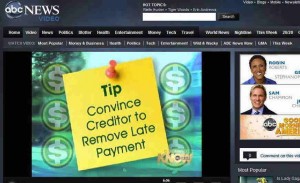See if you can follow this.
The players
The Consumerist, a former property of notorious Gawker Media, is now owned by Consumers Union, publisher of Consumer Reports. The move is nearly inexplicable, but, apparently, CU thinks that that is how to get young and hip. But there is a firewall. A new entity, Consumer Media LLC, houses The Consumerist. The domain was registered by Consumers Union in December, 2008. Requests for the home page of http://consumermediallc.org/ are redirected to consumerist.com.
Mint.com is owned by Intuit, the publisher of Quicken personal finance software. Mint/Quicken is a Believer, saying, viral video-style:
These days, credit scores are not only used by lenders but by everyone from landlords to prospective employers. A bad score can keep you from getting an apartment, a mobile phone or even a job. – Quicken, March 4, 2010
Now before you get sucked in by that bit about employers, see this video for another perspective.
Other minty-fresh advice includes:
Make a large purchase using your credit card and pay it off immediately. This impressive payment behavior will earn you good marks. – Mint.com
The only guy likely to be impressed is the one you buy the big-screen TV from . A history of a large balance is not part of the FICO score scheme. And the only way to create a credit card history is to let a balance ride long enough to have a record. Further, as everybody knows by now, high balances compared to limits kill. But do enjoy your fabulous vacation.
Now, back to the story
Last week, the Consumerist gushed, “Mint.com has an exhaustive article about perfecting your credit to achieve the highest possible ‘elite’ score: anything over 800.”
Exhaustive? Hardly. More like exhausting.
According to Mint, the article (“Can You Increase Your Credit Score to 850”) is provided by Experian.com.
Experian.com in that sentence actually links to the disgraced FreeCreditReport.com owned by Experian. The national consumer reporting agency’s Web site was even parodied by its own regulator, the Federal Trade Commission. In the ultimate irony, the FreeCreditReport.com’s home page has to ask the question a consumer might wonder about a site with such a name: “Why isn’t my Credit Report free?” Oft-quoted credit report expert John Ulzheimer calls a recent FTC action the Experian Rule.
Mint.com addresses the concerns of its members:
We link to services provided by two of the largest credit bureaus (FreeCreditReport.com by Experian and TrueCredit by TransUnion) because banks and financial institutions check your credit profile with these bureaus. The services give you access to your credit score, credit report, and credit monitoring alerts.
Fake-O FICO Funk
However, the credit score at Experians’s FreeCreditReport.com is not sold to lenders. That score, the PLUS, is a Fake-O (a term acquired by a member of Congress in a hearing last month).
Lots of people in social media dig the 850 score Mint article. In its first paragraph, it mentions a consumer who thinks he is “a financial unicorn,” and explains that only 5.7% of Americans achieve an 800 (according to Credit Karma). The next paragraph refers to the consumer’s FICO score. However, FICO states that roughly one in 8 have a score of 800 or more. Further, myFICO.com illustrates the 800 club with the figure 13%, not 5.7.
And then, there’s this in the Mint piece: “Since debt utilization makes up 30 percent of your credit score – the second biggest factor after timely payments – carrying a balance can keep you out of the credit-elite category.”
So, here’s the big question: If debt utilization is 30%, then what percentage is “Number of accounts with balances“? And, what percentage is the “Lack of a specific type of balance, in some cases”?
Finally, Mint.com suggests, “In general, the rules to join the credit elite are simple: make timely payments, keep your credit utilization up to about 25 to 35 percent of your available credit, and minimize credit inquiries.” But, FICO disagrees. Su–ze — Or–man, whose face you can see– right– on– myFICO.com, writes, “The FICO brain trust says there is no specific number that qualifies as a ‘good’ ratio, just that lower is always better.” And, FICO spokesman Barry Paperno said, flat out, “The lower that utilization number is, the better it is for your score.” The scrap heap of comments in that regard just got a little bigger.
Impossible
But, by far, the worst thing about the Mint credit score article is that its “provider,” Experian, can’t even come to an arrangement with FICO to allow consumers to see their FICO score like the other two national consumer reporting agencies. And the scale of the PLUS score, the score to which the article links through FreeCreditReport.com, ends at 830, not 850 as in the title. In other words, you could do everything right– make all your payments on time, pay down your credit cards, have the optimum number of accounts– and pay the admission to check your score regularly and religiously for years. But you would never get to 850 because that number doesn’t exist in the PLUS score range.
If the notion behind Consumers Union is buyer beware, reader beware of Consumers Union. One thing is for sure: Whenever Experian or Consumers Union is involved, nonsense is sure to follow.
